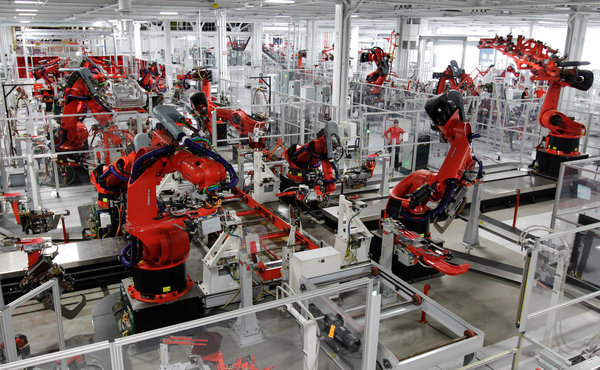China's future robotics development
- By Eugene Clark
 0 Comment(s)
0 Comment(s) Print
Print E-mail China.org.cn, January 11, 2014
E-mail China.org.cn, January 11, 2014
China will depend upon advances in technology, especially in the field of robotics, to maintain its competitive economic edge, especially as its population ages and the size of its workforce declines.

The growth of robotics is also likely to bring about major societal changes, including reshaping the world of work, not only in manufacturing but in service sectors including education and health care. According to the International Federation of Robotics, China's demand for robots will increase from 26,000 to 35,000 through 2015, and is likely to increase dramatically thereafter.
If China is to achieve its goals in relation to robotics, then solutions must be not just technical. In addition, there are at least three other major challenges that must be overcome. The first is the need to achieve clarity and certainty with regard to the legal and ethical issues involved. For example, driverless cars are already available and have been legislated in several American states. However, ethical standards, product liability, agency, safety standards, insurance and other legal issues will need to be resolved so that people developing this industry will have enough certainty to risk the substantial investment required.
Among the legal issues that must be resolved are:
• Legal definition of "robot." The law will have to have a clear definition of what exactly is meant by "robot?" Just as cyber law had to depend upon extending traditional metaphors and analogies to contexts involving the Internet, so too appropriate legal metaphors must emerge which will allow government, courts and others to design the appropriate legal infrastructure that will provide the necessary guidance for this new industry to evolve.
• Balance. The law is about conflict and the need to balance competing interests. The design of legal rules that govern robotics will need to achieve the appropriate balance between encouraging innovation through robotics and related technologies and ensuring public safety, particularly in the context of autonomous robots.
• Agency issues. The law of agency is especially relevant to robotics and covers the legal principles governing the liability when one person acts on behalf of another. An example is a software-only system such as automated trading agents which have caused serious "flash crashes" in share markets in the United States.
• Responsibility. Given that robots will be acting autonomously or sometimes in partnership with a human, we will need to determine rules for placing ethical and legal responsibility with the appropriate party. This issue could get very tricky especially in relation to new generations of autonomous robots that are also equipped to learn in much the same way that humans do. Although it is in the realm of science fiction now, some argue that as robots assume more and more human qualities, we will have to even consider legal rights for robots.
• The rules governing robots will have to be adapted to widely varying contexts ranging from robots conducting interviews, dispensing advice, looking after patients, providing transport, looking after security needs and military usage. Different contexts may require different legal and practical considerations.
• Health, safety and employment law issues will need to be resolved as robots enter for example the world of work and encounter new environments outside of the laboratory and contexts in which they will interact with humans, sometimes in unexpected ways and with unexpected and/or unintended results.






Go to Forum >>0 Comment(s)